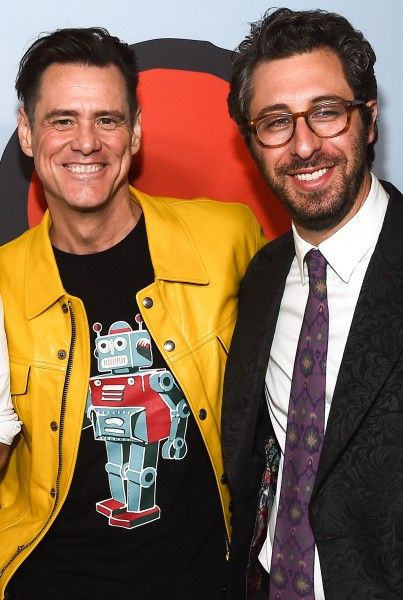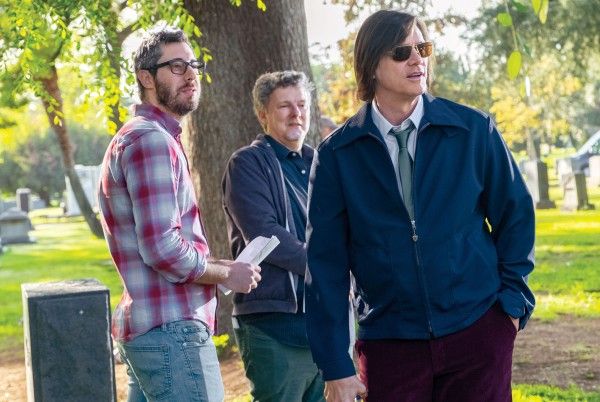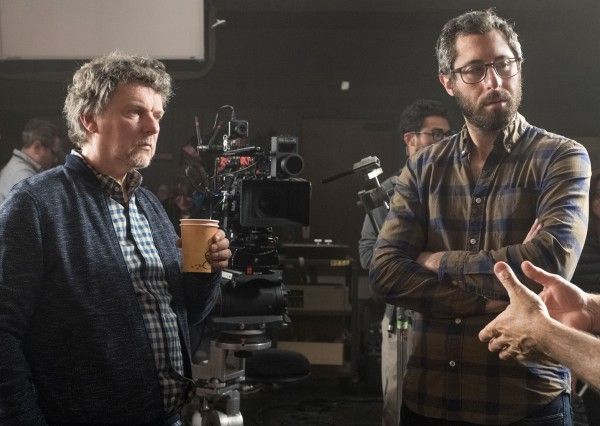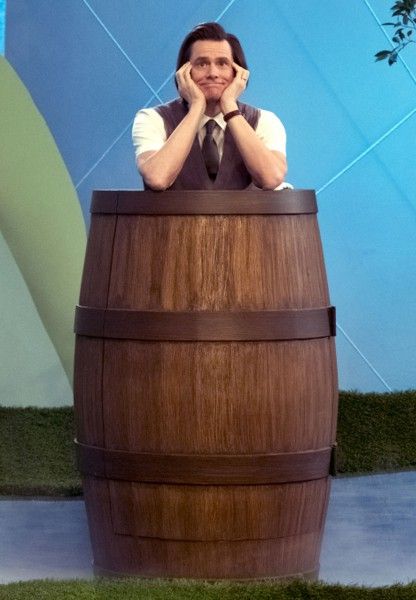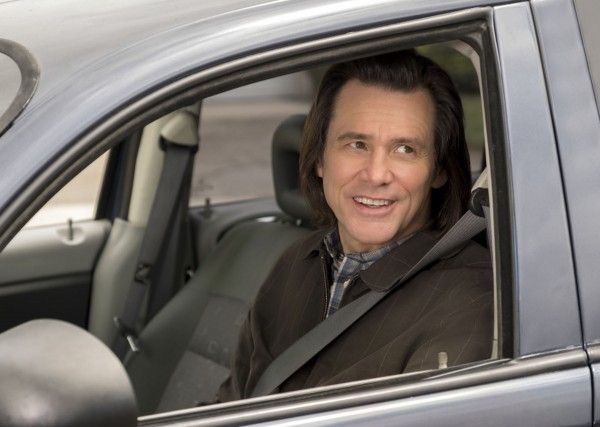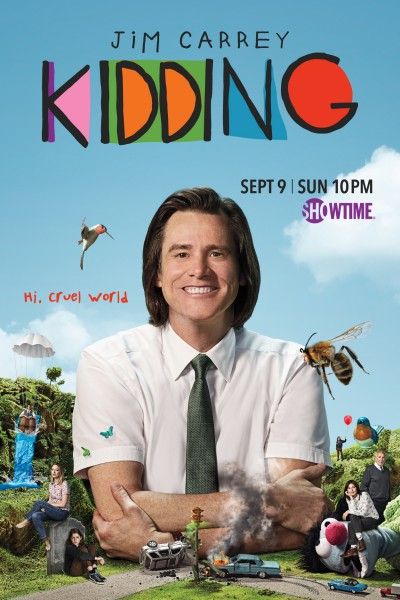From creator Dave Holstein (Weeds, Raising Hope) and director/executive producer Michel Gondry (Eternal Sunshine of the Spotless Mind), the Showtime series Kidding follows Jeff (Jim Carrey, in a brilliant performance that’s his first series regular role in more than two decades), who’s also known as Mr. Pickles, an icon of children’s television. Although Mr. Pickles is supposed to be a beacon of kindness and wisdom for America’s youth, Jeff is finding it increasingly difficult to deal with his imploding personal life while his grief over a family tragedy causes a slow meltdown of his own sanity, in a way that is both heartbreaking and hilarious.
During this 1-on-1 phone interview with Collider, showrunner Dave Holstein talked about how impossible it would have been to pitch Kidding to networks, working with Showtime on this very unique project, how he found out that Jim Carrey was really on board, the biggest challenges in pulling this very complicated series off, and grounding the story in the simple idea of a man wanting his family back.
Collider: This show is odd, brilliant, disturbing and perfectly weird, and I can’t wait to see where it goes next. At the same time, it also makes me wonder, how do you describe this show to people at networks to try to get someone interested in putting it out there?
DAVE HOLSTEIN: What a great question. I didn’t. You couldn’t describe it. I just wrote it, as a spec script. I didn’t even try to pitch it ‘cause that was never gonna go well. The show is an exercise in fuck you creativity. We just want to make something unique. There are 500 shows on television. I don’t want to write 501. There’s just too much out there that’s all the same, and if I tried to pitch this, it would come across as Mr. Rogers becomes Bad Santa, or something that just sounds terrible, and that’s not the show. The show is an existential comedy about the duality of man. How do you pitch that? You can’t. You don’t do that. But what you do is get a bunch of people who are just as ambitious and just as weird and just as happy to make strong choices that not everyone’s gonna get, and hope that, at the end of the day, you’ve hit a bunch of home runs and didn’t burn your house down.
How did you end up at Showtime with this?
HOLSTEIN: I’ve worked at Showtime for a long time. I was on Weeds for seven years, and then I’m Dying Up Here. So, they know me, and they know what my strengths and weaknesses are, and they trusted that, with the right people, this could be something really cool. I told them, up front, “Look, we’re gonna try to make something really different. It might work, and it might not work, but we have too rare of an opportunity to get into a sandbox with Jim Carrey, Michel Gondry, Catherine Keener, Frank Langella and Judy Greer not to try really hard to make something unique.”
And then you had to find a kid to play Jim Carrey’s son, which seems like it would be an impossible task. Where did that kid come from?
HOLSTEIN: You sit through 400 auditions of 12, 13 and 14-year-old boys, before you find someone like Cole Allen. He’s so great. It’s easier to find girls that age, who can do what this show needs, which is a dramatic actor who can also tell a joke without telling a joke. Cole came from Austin, Texas, and he had never really acted before. A lot of boys in that age group tend to be trained for sitcoms or musical theater or horror movies. Very few of them have the ability to nuance, and I use that as a verb. He’s a really, really mature actor for his age. Can you imagine, your first day on set, you’re sitting across from Jim Carrey and you have to call him “dad”? He did a great job.
You wrote this script on spec, but you also wrote it thinking about Jim Carrey. When did you realize that there was actually a real possibility that he would play this character? Did you have a moment of, “Oh, my god, he’s really going to do this!”?
HOLSTEIN: Oh, yeah. There were probably far more moments when he was definitely not gonna do it, and this would have just stayed in my drawer and continued to get me work on dramedies. I was pretty content with this just being the script that everybody loved to tell me how much they loved it, but no one would want to make it. It had been in Jim’s orbit for a long time. You constantly check in and you’re like, “So, has he read it yet?” After over a year and a half, that becomes, “Can you please just ask him to pass on the script?” Eventually, you’re like, “It’s never gonna happen.” I remember being in the writers’ room for I’m Dying Up Here Season 2, right at the beginning, before I left to do this, and some writer asked how the show was doing, and I was like, “Don’t even get me started!” Jim’s producing partner was in the writers’ room, and he made the slightest twitch that something was going on, so it being a writers’ room, everyone was like, “You’ve gotta tell us. There are no secrets in the writers’ room.” I knew that was gonna get unhealthy, so I said, “Whatever, it’s fine.” Then, I called him after work and I said, “You’ve gotta tell me.” And he said, “Well, Jim has been reticent to do television because, from his perspective, that’s not where movie stars go to work. It’s where they go to die. But Michel Gondry read the script and he loves it and he wants to do it, and if he does it, Jim’s gonna do it. So, what are you doing on Sunday?” That was after years and years and years of pushing that boulder up the hill. So, to answer your question, there was a moment, and it was a pretty awesome moment.
How did Michel Gondry get involved?
HOLSTEIN: I think Jim’s producing partner, Michael Aguilar, who’s an EP on the show, sent it to him. He was in Chile, shooting a commercial, and then he was in L.A. for a whole 48 hours. During those 48 hours, we had to make everything work, and we did. It was a real special couple of days.
Did you ever seriously consider trying to find somebody else who could do this role, or was it always, if Jim Carrey didn’t do it, it was just going to get filed away somewhere and never happen?
HOLSTEIN: I tried. We went after lots of legitimate people, who were just not right for it. I wrote it with Jim in mind, tragically. I’m just pulling this out of a hat, but I’m sure Kevin Kline would have done a very terrific job at a version of this show. But you’d just have to tailor everything to their instincts and what they do best, and it just wasn’t tailored that way. We would have just been asking a lot of actors to try on a suit that didn’t fit quite right. The first line in the script, that I wrote in 2013, was, “Jeff Pickles – think Jim Carrey and fondly remember The Truman Show.” It was always for Jim.
Watching this, I can’t imagine anybody else doing this performance. You should just hand him an Emmy Award now.
HOLSTEIN: That makes me proud to hear, just in the sense of, you spend a long time pushing this thing up a hill and, in the end, you just want it to feel like its own thing.
Especially not having seen Jim Carrey act a lot recently, this just reminds you of everything he can do.
HOLSTEIN: Yeah. You can give him the opportunity to be comedy Jim, drama Jim, dark Jim and singsong Jim. You can just pick a Jim.
What was it like to be on set with him and Michel Gondry? Was it weird to figure out how you fit in among their working dynamic?
HOLSTEIN: Like with any collaboration, you have to find a rhythm. I’ve worked on lots of shows with lots of strong personalities, and everyone has a language that you have to learn. This was a three-way relationship, and one of those languages happened to be French. It was a really lovely and productive conveyor belt of ideas. By the end of it, I think we really got along very well. It’s interesting, you have their relationship, which has been around since they did [Eternal Sunshine of the Spotless Mind]. Everyone’s careers and lives are in different places now, and people have different expectations of themselves. Here I am, this 35-year-old kid, who’s like, “I’m gonna run this thing now.” It’s a real experience. Fortunately, I think when everybody has a mutual respect for what everyone is best at, you get a good product.
It’s hard enough to make a TV series, but you’re also doing a TV series within a TV series. What were the biggest challenges in pulling all of this off?
HOLSTEIN: Yeah, name your difficulties. Aside from the fact that you have a director who speaks French, doing a comedy in English, you also have a show within a show that involves original songs that have to be written and puppets that have to be made. The puppets have to essentially be woven into the fabric of the story, on a metaphysical level, because they have to pay off in later episodes, in different ways, which I won’t spoil. Then, you have someone with a completely tragic backstory, but you don’t want the show to slide into a really sad, griefy tone that puts you off, after the first couple of episodes, so you have to work very hard to balance that. And you still have to fight all of these voices in your head, saying that there are a thousand ways this thing can go wrong. Frankly, that’s the exciting part of a show like this. You’re threading a needle, and you’re working with volatile personalities and oddballs and weirdos. At the end of the day, you’re getting creative juice that’s just very different from anything else you could come up with. So, specifically, the challenge is just keeping everything beautiful and not messy.
How hard will it be for this guy to be good and stay good while everything around him seems to be spiraling out of his control?
HOLSTEIN: If you think about what he wants, what he really wants is to win his family back. He really wants to build up a world that can’t exist anymore. His family is never gonna be his family. I, personally, like the story engine that begins there because what you’re telling me is that he wants something that he can never have, so there’s always gonna be a struggle and a compromise, and there’s always gonna be comedy coming from the absurdity of wanting something that doesn’t exist. You’re gonna have ways to drive through all of that, on a story level, but it can’t just be a guy that goes insane, after three episodes, and you’re done. It can’t just be a guy that has a breakdown. To me, it’s more apt to say that he’s gonna have an emotional breakthrough rather than an emotional breakdown. In the end, personally, I’m rooting for someone, in this day and age, who’s actually legitimately kind to succeed and survive. He’s someone who doesn’t curse and doesn’t lie and doesn’t bully. I want that guy on TV, and it’s our goal to make you also want that.
And something as simple as just wanting to keep your family together is something that everybody can relate to.
HOLSTEIN: Yeah. When you take a story that you can ground emotionally, which is a guy wanting his family back, it’s just a simple story. It lets you hang a lot of absurdist elements off of it that complement it and give it tone. To me, the most successful version of this show is a satisfying emotional arc like that, but told and executed with these visual elements that are strange and weird and, hopefully, create a little bit of beauty in there and make you feel something.
Kidding airs on Sunday nights on Showtime.


